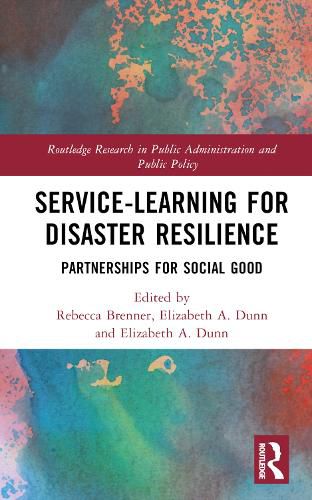Readings Newsletter
Become a Readings Member to make your shopping experience even easier.
Sign in or sign up for free!
You’re not far away from qualifying for FREE standard shipping within Australia
You’ve qualified for FREE standard shipping within Australia
The cart is loading…






This book is the first to discuss, in practical and theoretical terms, the pedagogical approach of service-learning to establish partnerships for social good that build disaster resilience. Across twelve chapters a collection of academics and practitioners provide insights on the benefits of utilizing service-learning to address existing needs, build community capacity, and strengthen social networks while enhancing student learning.
Key features:
Discuss how sustainable service-learning partnerships can contribute to building disaster-resilient communities; Provide practical tools to cultivate and manage collaborative partnerships, and engage in reflective practices; Integrate disciplines to create innovative approaches to complex problems; Share best practices, lessons learned, and case examples that identify strategies for integrating service-learning and research into course design; Offer considerations for ethical decision-making and for the development of equitable solutions when engaging with stakeholders; Identify strategies to bridge the gap between academia and practice while highlighting resources that institutions of higher education can contribute toward disaster preparedness, response, recovery, and mitigation.
Service-Learning for Disaster Resilience will serve as a user-friendly guide for universities, local government agencies, emergency management professionals, community leaders, and grassroots initiatives in affected communities.
$9.00 standard shipping within Australia
FREE standard shipping within Australia for orders over $100.00
Express & International shipping calculated at checkout
This book is the first to discuss, in practical and theoretical terms, the pedagogical approach of service-learning to establish partnerships for social good that build disaster resilience. Across twelve chapters a collection of academics and practitioners provide insights on the benefits of utilizing service-learning to address existing needs, build community capacity, and strengthen social networks while enhancing student learning.
Key features:
Discuss how sustainable service-learning partnerships can contribute to building disaster-resilient communities; Provide practical tools to cultivate and manage collaborative partnerships, and engage in reflective practices; Integrate disciplines to create innovative approaches to complex problems; Share best practices, lessons learned, and case examples that identify strategies for integrating service-learning and research into course design; Offer considerations for ethical decision-making and for the development of equitable solutions when engaging with stakeholders; Identify strategies to bridge the gap between academia and practice while highlighting resources that institutions of higher education can contribute toward disaster preparedness, response, recovery, and mitigation.
Service-Learning for Disaster Resilience will serve as a user-friendly guide for universities, local government agencies, emergency management professionals, community leaders, and grassroots initiatives in affected communities.